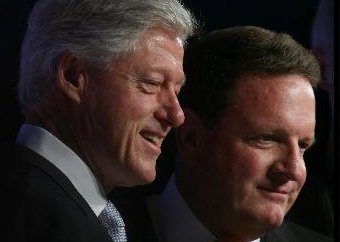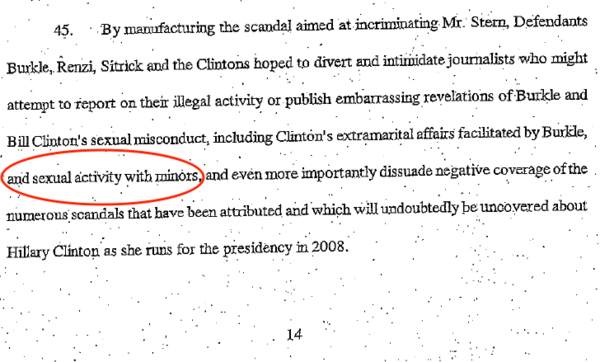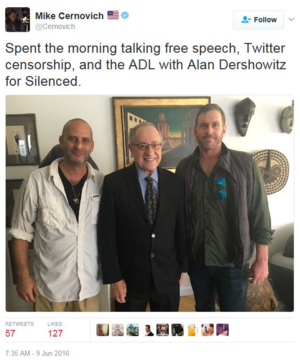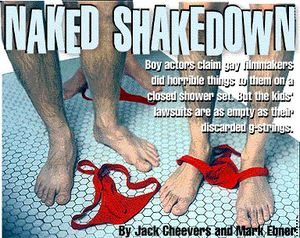Stringing Cheese: Burkle and Bill's Dirty Little Secret and the Importance of Researching Legal Docs
This article discusses the explosive information found in Jared Paul Stern's verified complaint in his defamation case against Ronald Burkle, Bill Clinton and others. It will provide the background on the ''Stern v. Burkle'' dispute and use it as an introduction into a discussion on the importance of researching documents filed in legal cases and how the citizen investigator can access such documents using PACER.
This article is part of Stringing Cheese, a series by Pizzagate Wiki admin Peter Venkman which focuses on finding the connecting threads in the Pizzagate and Pedogate investigations.

Bill Clinton and Ronald Burkle
Introduction
I'm not going to bury the lede:

Clause 12 from Jared Paul Stern's Verified Complaint (with annotation)

Clause 45 from Jared Paul Stern's Verified Complaint (with annotation)
A full copy of the complaint can be found on the Pizzagate Wiki.
Some of you may have seen these clauses in the last couple weeks - the Pizzagate.Wiki team broke the story, but we also felt it was worthwhile to examine them again with some background.
These clauses come from Jared Paul Stern's verified complaint in a defamation case against Ronald Burkle, Bill Clinton and several other nefarious actors.
This complaint, unlike most other complaints, is a ''verified'' complaint. This form of complaint includes a signed addendum from the plaintiff that all statements made within the complaint are "under oath" and subject to the penalty of perjury if the plaintiff is found to have been lying. With verified complaints, the plaintiff must have personal knowledge of allegations in the complaint or, if the plaintiff does not have personal knowledge, the plaintiff must believe them to be true based on specified information, documents, or both.(1)
The Jared Paul Stern Dispute
In the mid 2000's, Ronald "Ron" Burkle was getting hammered in the gossip columns. Scandals involving his divorce and a falling out with his girlfriend were flooding the pages of Gawker and the New York Post's Page Six. Reporters were digging into Burkle's sordid personal life and he wanted it to stop.
Ron Burkle decided to go after NY Post Page Six writers who wrote about him, including Richard Johnson and Jared Paul Stern. According to Stern, Burkle was engaged in surveillance on the Page Six staffers for "dirt" gathering purposes. As part of that plan, Burkle setup a meeting with Stern on March 22nd, 2006, at a Manhattan apartment Burkle rented.
During the meeting, Burkle offered to invest in Stern's side venture, Skull and Bones, a clothing line. Even though there was no evidence of extortion, Burkle helped manufacture FBI and DOJ investigations with the help of his connections in the federal government via his best buddy, Bill Clinton. Stern did not know he was recorded, but it is legal in New York State for one party in a conversation to secretly record it, even without the other party's consent.
A second meeting took place on March 31, 2006, again at Burkle's invitation, focusing more on the New York Post and a possible financial arrangement. Burkle struggled to make the potential investment sound like extortion on the part of Stern and, failing miserably, would constantly leave the room when parts of his plan wouldn't work. Unbeknownst to Stern, Burkle was leaving the room to talk to his handlers, which Stern believes included intelligence personnel, who had bugged the whole room and were assisting in the entrapment of Stern. However, since the plan didn't succeed, the FBI and DOJ refused to bring any charges due to the lack of evidence supporting Burkle's allegations. The recordings of the meeting in question have never been released to the public, nor has any information on the FBI or DOJ's investigation as far as I've found (a few FOIA requests are probably in order).
Even though the FBI and DOJ investigations were dropped, Burkle worked with Hollywood fixer, Mike Sitrick, to run with the extortion story regardless. Using connections at the NY Daily News, the media proceeded to blast Stern and eventually got him fired from his role at the NY Post. Stern would later retaliate by suing the NY Post for wrongful termination and Burkle and his cabal for defamation. The complaint in that latter case is what you see above.
The case would be dismissed by the elected Liberal Party judge, Walter B. Tolub, on specious grounds, with Tolub claiming the defamation claims weren't specific enough. It should be noted that Tolub was also the judge who ruled in favor of Jeffrey Epstein during a separate legal case involving one of Epstein's victims who was allegedly born a man.(2)
Unfortunately, it seems Stern really did have the most sordid details of Burkle's life, including him and Bill engaging in sex with minors. Stern's source for that information has never been published.
The Search for Legal Documents in the Jared Paul Stern Case and an Introduction to PACER
Pressing charges for extortion cuts two ways. Considering Burkle's close friendships with convicted sex offender Jeffrey Epstein and repeatedly-alleged pedophile, Michael Jackson, it wasn't hard to imagine what information Burkle didn't want revealed to the public. The Jared Paul Stern case came to my attention when I was doing research on Clinton associates purchasing press outlets. Burkle had secretly bought gossip publication, Radar Online, which was also going after Jared Paul Stern at the time of the dispute.
Gawker, who itself would later be bought by Clinton friend and mega-donor, Haim Saban, during the Gawker shutdown, reported on the Jared Paul Stern case, including some of the elements of Stern's complaint. One particularly interesting line was, "11. Burkle's house is a scene of numerous debaucheries!"(3) Gawker had also published a rumor in late 2007 that Burkle and Epstein were involved in a sex trafficking ring that involved minors.(4) Based on these facts, I figured more investigation into Stern's complaint was necessary.
I immediately went to PACER, which stands for Public Access to Court Electronic Records. It is an electronic public access service that allows users to obtain case and docket information online from US federal appellate, district, and bankruptcy courts. By searching for "Ronald Burkle", I found the docket for his case with Jared Paul Stern. A docket, for those unfamiliar, is simply a record of the proceedings of a court case,(5) but a docket also provides a lot of information in itself, including plaintiffs and defendants, as well as a timeline of events in a court case.
As it turned out, the complaint in the Jared Paul Stern case was not available on PACER, but I had the parties and the case number from the docket, so I took to Google using this information to search to see if a copy of the complaint had leaked or been posted elsewhere. I lucked out and that was how the verified complaint was found.
Using PACER
PACER is not just for lawyers - it is available to everyone. PACER is provided by the Federal Judiciary in keeping with its commitment to providing public access to court information via a centralized service. It is free to register and access comes within a week or so. However, while registration is free, there are some very small costs involved when accessing documents.
Certain documents will cost some money to access, though most are available for 10 to 20 cents. If a PACER user keeps their total costs to under $15 during a quarter, the fee will be waived entirely.(6) Some of the more expensive documents to access are often not all that useful for investigative purposes, such as Bankruptcy documents which may cost up to six dollars. There are also generally warnings before accessing more expensive documents.
After obtaining your registration, you can begin searching cases. Simply login, click "FIND A CASE", and then click "Search the PACER Case Locator." In the PACER Case Locator page, enter any of the information you possess about the case. However, you can also take a person you're investigating and simply put in their name as a party and see what cases pop up. That methodology was useful when I was investigating Bryan Singer as it brought up a case I did not previously know about (which is discussed further below).
Here are a few links and additional quick tips:
- PACER Homepage
- PACER Registration
- To help keep costs low, you can save a copy of the dockets relevant to the cases you're researching, and you can also download PDFs of important filings so you don't need to re-access them (which re-triggers charges).
- Documents that possess statements of facts or parties' allegations are likely to be the most useful for the purposes of this citizen investigation. Some examples are complaints, responses and affidavits.
- Judge's opinions and dissents can also be useful to help clarify some of the issues presented in the case. However, documents that come directly from the court that only relate to court procedures, such as motions, can simply be about scheduling changes, permission to add attorneys and the like - without providing any particularly interesting information.
- If you want to know how a case is proceeding, you can check in on its docket from time to time. Personally, I check in often on all of the ongoing cases involving Jeffrey Epstein and his madam, Ghislaine Maxwell.
Other Notable Discoveries via Legal Filings
Mike Cernovich and Alan Dershowitz

Twitter Photo of Dershowitz and Cernovich
Praise came pouring out from our citizen investigators for Mike Cernovich when he filed a motion for documents to be unsealed in Virginia Louise Roberts Giuffre's defamation case against Ghislaine Maxwell. We presumed that more sordid details regarding Jeffrey Epstein would come to light. However, I checked in on that case's docket on PACER, as I normally do, and noticed something odd. While I assumed Giuffre and her attorneys would be in favor of the unsealing, they actually filed a response in opposition to Mike Cernovich's motion to intervene.
What was going on here? As it turns out, Cernovich was asking for the same documents to be unsealed that Alan Dershowitz asked to be unsealed. Dershowitz was Jeffrey Epstein's attorney in his original trial and Dershowitz was also accused by Giuffre of (statutorily) raping her. In this response from Giuffre's team, we see that Mike Cernovich is close with Dershowitz and Cernovich was using his status as a member of the press to try and get the document unsealed on news reporting grounds. What information were Dershowitz and Cernovich requesting? Victims' names, which were sealed under Court Protective Order (DE 62).
During Epstein's original trial, Dershowitz and the rest of Epstein's legal team hired private investigators to harass victims (and prosecutors) to discourage those parties from testifying. With victims' names unsealed in the current cases, Dershowitz would be able to pull the same stunt once again to prevent these victims from testifying in Giuffre's lawsuits against Epstein and Maxwell.
The Pizzagate.Wiki team subsequently broke this story as well. Giuffre's response unfortunately adds a lot of skepticism regarding Cernovich's intentions behind his motion to intervene.
Bryan Singer's Actions on the Set of Apt Pupil

"Naked Shakedown'', an article discussing the events on the set of ''Apt Pupil''
After watching An Open Secret, and noticing some of the connections between Jeffrey Epstein and Digital Entertainment Network ("DEN") investors (for more, see my previous article Understanding Jeffrey Epstein's "Little Black Book"), I began further research on Bryan Singer.
I used PACER to see what cases were made against Singer. One I hadn't previously heard of before came up, alleging that Singer forced minors to commit lewd acts in the nude during the filming of a shower scene for the film, Apt Pupil. The information in the docket led me to find additional articles on the subject from the time, such as one from Variety which said there were three lawsuits in total related to Apt Pupil.(7) I would also find an article on the subject that would go into more detail about what transpired called Naked Shakedown.(8)
Most important about this discovery, was that it shows Bryan Singer has a troubling history with minors that did not start with the allegations against him during the DEN lawsuits. This example highlights the importance of doing these sorts of checks on alleged sex offenders to see if certain incidents are isolated or part of a pattern. In Singer's case, it is clearly part of a pattern.
Conclusion
Legal documents can provide a wealth of useful information about some of the illicit activities our suspects engage in. With this introduction to PACER, my hope is more citizen investigators will add this vital resource to their toolkit.
As always, if you make any notable discoveries in your investigative work, share them to the Pizzagate subverses on Steemit.com and Voat.co.


Detailed. Nice work and effort put into the article. Also thanks for the introduction to PACER.
If you didn't know, access to PACER is a huge part of what Reddit founder Aaron Schwarz was attempting to give the public free access to before his unfortunate passing. It's an amazingly underutilized resource, but that's seemingly by design. PeterVenkman did some stellar hands-on work here though proving it's not impossible to still use it for good.
Yes, thank you for this resource. Somehow I only remembered JSTOR in connection with Aaron Schwarz (RIP) and completely forgot about his work concerning PACER. Appreciated.
Solid as always, and educational. I'd never heard of PACER either. Thanks for sharing!